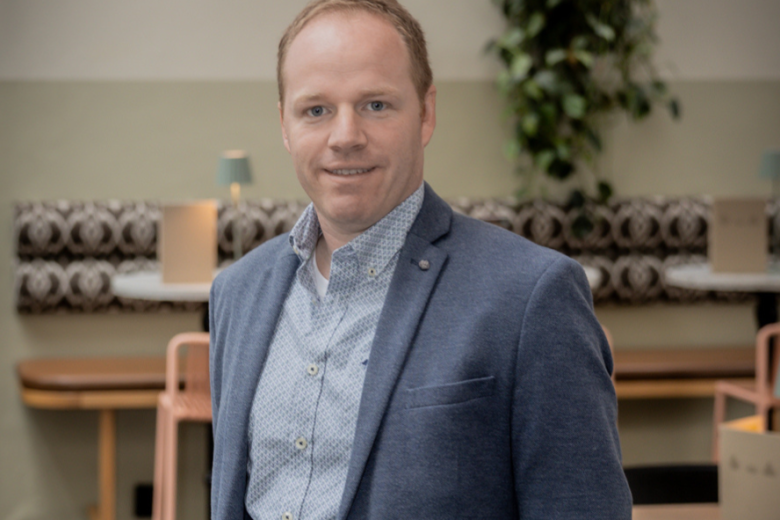Caroline Coeckelbergh - never too old for sun protection
Despite widespread awareness campaigns and well-known prevention strategies, the number of skin cancer cases continues to rise. It is now the most common form of cancer in the Netherlands, particularly among people over the age of 65. According to Caroline Coeckelbergh, alumna of the master’s programme in Health Education and Promotion, older adults acknowledge the risks of sun exposure, yet paradoxically underestimate their vulnerability - precisely because of their age.
Sun protection at any age
Caroline based her findings on the determinants study from her master’s thesis ‘A qualitative exploration of sun protection behaviour and underlying socio-cognitive determinants in Dutch and Belgian Elderly’. “My supervisor gave me a list of broad topics to choose from. UV protection was one of them, and I focused my research on the determinants of sun protection among older adults.”
To better understand why skin cancer is becoming increasingly common in older adults, Caroline set out to analyse the behaviour of this target group. She found her participants at the ‘Maastricht Senior Choir’. “Everyone was willing to participate, which was encouraging. Based on this willingness, I had initially expected the results to be less concerning.”
The interviews showed that older adults do acknowledge the link between sun exposure and skin cancer, but they tend to avoid using sunscreen or wearing clothes that fully cover the skin. “Sunscreen is often perceived as something impractical and leaves them with a greasy feeling. What’s striking is that these people are strict when it comes to making sure their grandchildren wear sunscreen. So there is awareness, but because of their age, they no longer feel vulnerable enough to act on it.”
Choosing the master’s in Health Education and Promotion was one of the best decisions I’ve ever made. I did my bachelor’s in nutrition science, but thanks to this master’s, I can now view health in a broader context than food.
The Unilever Research Award
Caroline explored this perception using the determinants of the Health Belief Model. “This model looks at people’s perception of the risk of a disease, the pros and cons of taking preventive action, and the kind of cues that are needed to trigger that action.” She learned about this model during the master’s in Health Education and Promotion.
The quality of Caroline’s thesis was so high that Francine Schneider, her supervisor, submitted it for the annual Unilever Research Award, a prize for master’s theses that contribute to the United Nations Sustainable Development Goals. She was selected as one of the winners and represented Maastricht University.
Francine: "Caroline approached this subject with great enthusiasm and drive, took an extremely energetic and creative approach to recruitment, and carried out, analysed and reported the research with great precision and thoroughness. And, in addition, she is also a very pleasant, positive person to work with."
“It was a rewarding way to conclude what had been an incredibly enriching year", Caroline states. "Choosing the master’s in Health Education and Promotion was one of the best decisions I’ve ever made. I did my bachelor’s in nutrition science, but thanks to this master’s, I can now view health in a broader context than food. My fellow students had a wide range of academic backgrounds, which makes working on cases all the more interesting.”
After graduating, Caroline joined the Vlaams Instituut Gezond Leven as a staff member in the nutrition team. “I’m working on a European project in which we explore how to encourage healthy and sustainable eating habits in the home. During my master’s, I learned how to communicate complex information in an accessible way for different target groups. My future isn’t fully mapped out yet, but I’d love to continue developing and designing interventions.”
Applications for Health Promotion are processed via Studielink under the former programme name, Health Education and Promotion, as registered in the Central Register of Higher Education Study Programmes (CROHO).
Maastricht University has submitted a request to change the programme name, which is currently pending final approval. Following approval, and upon completion of the programme, students receive a diploma issued under the new programme name.
Also read
-
Is prevention cheaper than cure?
Preventing disease is not always cheaper than treating it — but it can be vital for keeping healthcare affordable and accessible. Professor Mickaël Hiligsmann (VHC), newly appointed Professor of Health Preferences and Economics of Prevention at CAPHRI, studies how preventive measures can deliver...

-
Sophie Jooren - Compliance to local tobacco policies
Whether a specific intervention to create a smoke-free outdoor environment is effective or not has been widely studied. However, to improve compliance, policymakers need to understand how smokers react to those interventions and the factors influencing their compliance.

-
Sweeteners help maintain weight loss after dieting
Overweight people who want to lose weight successfully are better off supplementing their healthy diet with sweeteners than with foods containing sugar products. An international study, in which Maastricht University (UM) participated, shows that people who supplement their diet with sweeteners are...
